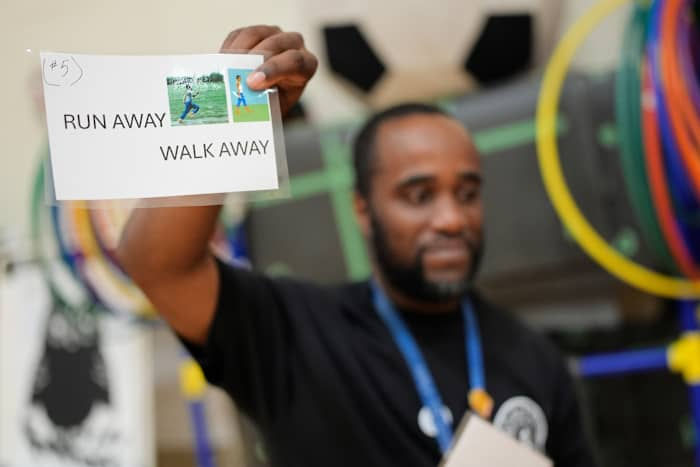Some states are requiring gun safety lessons in schools that teach kids ‘stop, don’t touch’

**Students as Young as 5 to Receive Gun Safety Lessons in Public Schools in Some States**
This school year, students in elementary, middle, and high schools across several states will be introduced to a new safety lesson: what to do if they find a firearm. Arkansas, Tennessee, and Utah have become the first states to enact laws requiring public schools to teach children as young as five the basics of gun safety and proper gun storage in the home.
Of these states, only Utah’s law allows parents or guardians to opt their children out of the lesson. Meanwhile, a similar proposal in Arizona was vetoed by the state’s Democratic governor, and lawmakers in at least five other states have introduced comparable bills. This places schools at the center of yet another debate about gun violence and safety in America.
### Engaging and Practical Safety Lessons
In Tennessee, lesson plans may include a variety of engaging materials such as stickers, games, quizzes, and videos featuring music and colorful gun illustrations—including depictions of toy-like guns and explanations of terms like “muzzleloader.” The reality is that many American children grow up around firearms.
At Berclair Elementary School in Memphis, a recent classroom survey of 16 fifth graders revealed that nearly all had seen a real gun. “It just shows you how much a class like this is needed,” said Tammie Chapman, a health and physical education instructor leading the lessons at Berclair.
“While there is some controversy around guns, there doesn’t always have to be,” said Emily Buck, director of public relations for the Tennessee Wildlife Resources Agency. The agency collaborated with the state Department of Education to create the gun safety curriculum. “Having some education and foundational knowledge really can be beneficial in the long run,” Buck added.
### “Stop, Don’t Touch, Leave Quickly, Tell an Adult”
These new lessons are often adapted from existing hunting safety courses provided by state hunting and wildlife agencies, but with important differences. Hunter safety courses involve hands-on instruction and include how to safely handle and discharge a firearm. The new classroom lessons, by contrast, emphasize that children should never touch a firearm.
Tennessee’s law prohibits any use of real firearms in the classroom, but Arkansas’ law gives parents the option to select alternative curriculums, including off-campus courses that could involve live firearms.
The primary instruction for students who discover a gun is consistent across these programs: **stop, don’t touch, leave the area quickly, and tell an adult**. This message mirrors guidance from organizations like the National Rifle Association, which offers similar safety resources featuring animated characters, videos, and coloring pages.
At Berclair Elementary, teachers have created interactive activities to reinforce the message. During a recent gym class, students participated in a relay-race game where they searched for buckets containing photos. If a student found an image of a firearm, they were to report it to an adult. Students also listened to a catchy jingle highlighting the key steps.
Emily Buck pointed out that, in many cases, adults are responsible for unsafe gun storage at home, making it crucial for children to know what to do if they find firearms in unexpected places such as on shelves or under mattresses. “We hope students will take what they learned back to their parents and maybe encourage them to adjust their storage methods,” said Buck.
### Aiming for Neutral Education
Gun legislation remains a highly partisan issue in the U.S., with Democratic-led states enacting stricter gun laws, while Republican-controlled legislatures tend to favor fewer restrictions. In Arkansas, Tennessee, and Utah, the education bills were backed and sponsored by Republicans. The language of the legislation mandates that the curriculum present neutral viewpoints on topics like gun ownership.
Some organizations such as Voices for a Safer Tennessee, a nonpartisan nonprofit formed after the Covenant School shooting in Nashville, have supported the legislation. The group supports responsible gun ownership and advocates for measures like expanded background checks.
Jessica Jaglois, director of communications for Voices for a Safer Tennessee, believes these lessons can spark important discussions at home. “It could possibly prevent a firearm tragedy from occurring, because we know that a moment of access can lead to a lifetime of tragedy,” Jaglois said.
According to the U.S. Centers for Disease Control and Prevention, firearms were the leading cause of death among children and teens in 2022. Data analysis shows that Arkansas and Tennessee have firearm death rates among children and teens that exceed the national average.
### The Debate Continues
Not everyone agrees that teaching kids about gun safety is the best way to prevent firearm tragedies. Some Democrats and gun control advocates argue that legislation focused on student education fails to address root causes.
“Using the school day to teach kids about guns won’t stop adults from leaving their firearms unsecured or keeping deadly weapons out of dangerous hands,” said Meg Beauregard, policy counsel fellow at Everytown for Gun Safety. “If lawmakers were serious about protecting students, they’d pass laws that hold adults accountable, such as secure storage—not put the burden on kids to keep themselves safe.”
### How Will Schools Implement the Lessons?
The new laws grant school districts flexibility in choosing whether to use state-provided lesson plans or adapt their own curriculums, as long as they meet the legal requirements. Individual schools also may decide which staff members will teach the lessons or invite law enforcement officers to discuss gun safety.
In Arkansas, Deputy Director Spencer Griffith of the Game and Fish Commission noted that schools might integrate gun safety into annual training alongside other emergency drills, such as those for fires or tornadoes. “We hope to prevent accidents, but not in a way that puts a political focus or fear around it because it’s just not the place for that,” Griffith said.
Berclair Elementary Principal Clint Davis emphasized that accidental shootings involving children are not a new issue. “It’s not something that’s necessarily just become a modern issue. It’s always been there, and I think we’re just now really responding to the need to provide that sort of training in school,” said Davis.
—
*Reporting by Kimberlee Kruesi and Adrian Sainz, Associated Press. Additional contributions from Jonathan Mattise in Nashville and Kasturi Pananjady in Philadelphia.*
https://www.clickorlando.com/news/national/2025/11/08/some-states-are-requiring-gun-safety-lessons-in-schools-that-teach-kids-stop-dont-touch/







